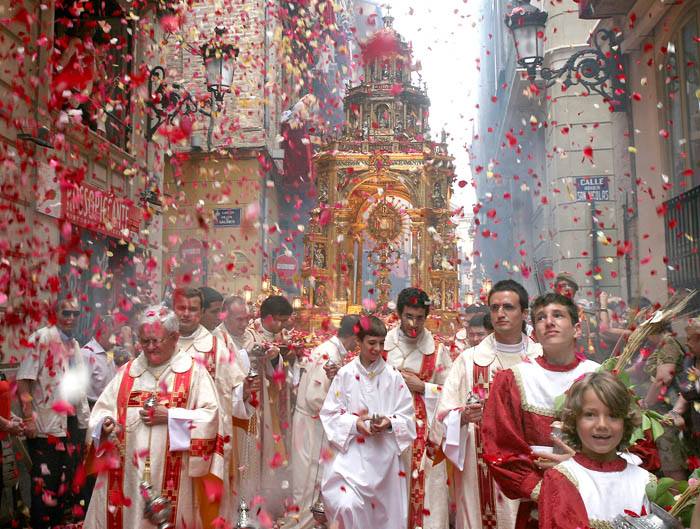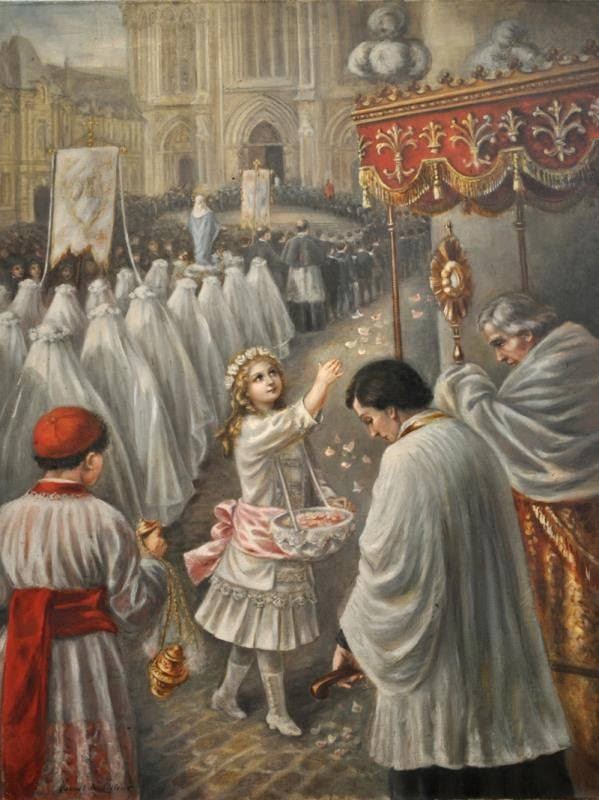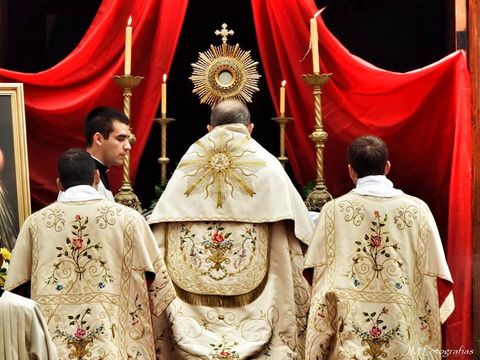
The great feast of Corpus Christi, on the Thursday after Trinity Sunday, was introduced in Flanders about 1246 AD. In 1264, Pope Urban IV extended the feast to the whole of the Universal Church. He was moved to do this by a miracle at Bolsena, when the Real Presence of Our Lord in the Eucharist, Body, Blood, Soul and Divinity, was visibly demonstrated to a doubting Bohemian priest. The composition of the splendid prayers, hymns and lessons for the feast were entrusted to the great Angelic Doctor, St. Thomas Aquinas. In the later Middle Ages, Corpus Christi came to be celebrated with ornate processions and expositions. It became a great demonstration of Christian faith.
I've explored before the fact that, in the days before Christendom was sundered by the Protestant Revolt, Christian civilization was notable for its deep cohesive unity.
Although the fallen nature of humanity and the reality of spiritual warfare meant that this unity was never perfect - and this is illustrated by the fact that a riot broke out at the Corpus Christi procession in Chester during 1399 AD, as well as the establishment of an ordinance at Newcastle in 1536 to avoid murderous discord between the Craft Guilds in the religious processions! - it was also the case that the underlying spiritual and civilizational unity was profound and widespread.Â
And so, the Most Holy Eucharist at the heart of existential reality brought unifying harmony in the realms of: the heart and the mind; the body and the soul; man and woman; parents and children; the family unit and wider society; the individual and the local community; the local community and wider society; Scripture, Tradition and Magisterium; the bishop and his priests; the priest and his people; the parish, the diocese and the Universal Church; the Church in Heaven, Purgatory and on Earth; the Church and the State; public and private devotion; culture and nature; leisure, prayer and work; faith and works; the calendar and the seasons; the ailing and the physically healthy; the living and the dead.
At the source and summit of all of these deep unities was the underlying Real Presence of Our Lord and Saviour, Jesus Christ, in the Most Holy Eucharist. By His Incarnation, and the continuation of His Crucified, Resurrected, Glorified and Ascended Real Presence in the Blessed Sacrament, Our Lord brought the most profound and foundational unity of all: that of the unity between God and man.
Before the Reformation, Catholics ''ate into'' this religious mystery at the heart of all things, with the whole of their body and soul expressing their belief, as parts of a corporate body; indeed as members of the Mystical Body of Christ. In unity, they prepared, they confessed, they sang, they processed, they prayed, they knelt, they adored and they ate.
Alas, the Protestant Revolt sundered each of these deep unities. After this tragic event, Christians were ''fractured out'' into Protestant ''churches'' as groups of individuals who now merely assented to certain key beliefs with their intellects. This reductionism, playing down the corporeal dimension of religous worship and experience as it does, is a key moment in the descent into extreme rationalist positivism. Gradually, even those key beliefs broke down into disharmony, with the result that disparate groups of individuals assented to often opposing sets of beliefs. In time, only the individual and their own unique self-assertion of their personal belief and will, came to impose itself.
In public and private worship, and thus in daily life, the lone intellect, with all of its limitations, weaknesses and sinfulness, had become radically sundered from the body of both the individual and the corporate body of the faithful. The post-modern confusion and isolation of our times is merely the latest stage of this unravelling. Even in the Catholic Church, in too many places in recent times, a similar minimalism in liturgical belief and practice has led to a related diminishment and harrowing of the faithful.
This is one reason why it is absolutely essential for Catholics to remain rooted in the Holy Eucharist at the heart of the Church. As St. Padre Pio used to say: ''Always remain close to the Catholic Church, for She alone can give you Jesus Christ in the Blessed Sacrament.''

Let us take forward and conclude today's article with a marvellous reflection from that great saint of the Holy Eucharist, the founder of the Blessed Sacrament Fathers, St. Peter Julian Eymard.
He wrote:-
To the testimony of her word, the Church adds the testimony of her example and practical faith. As St. John the Baptist, after having pointed out the Messiah, cast himself at His feet to prove the liveliness of his faith, so the Church devotes a solemn worship, her entire worship to the adorable Person of Jesus Whom she manifests to you in the Most Blessed Sacrament.Â
She adores Jesus Christ as God, present and hidden in the Divine Host. She pays Him the honour due to God alone; she prostrates herself before the Most Blessed Sacrament like the heavenly court before the majesty of God.
Distinctions of rank are not in order here: great and small, kings and subjects, priests and people instinctively fall to their knees before the God of the Eucharist.
It is the Good God!
The Church is not content to attest her faith by adoration alone; to that she adds public and magnificent honours.
The splendid basilicas are the expression of her faith in the Most Blessed Sacrament. She did not wish to build tombs but temples, a heaven on earth in which her Saviour and God might find a throne worthy of Him.
With a delicate and jealous attention the Church has regulated Eucharistic worship to its minutest details. She does not rely on anyone to take in hand the matter of honouring her divine Bridegroom; for everything is important, is significant, and divine, when there is question of the Real Presence of Jesus Christ.
She wants to consecrate to the royal service of Jesus all the most genuine and precious things in the world.
In her liturgy everything is related to this mystery; everything takes on a spiritual and heavenly meaning; everything has a property of its own and contains some special grace.
How easy it is for the soul to recollect herself in the solitude and silence of a church! A gathering of saints on their knees before the tabernacle causes us to exclaim: ''There is more than Solomon, more than an angel here!'' Jesus Christ is here before Whom every knee bends, of those that are in Heaven, on earth, and under the earth.
In the presence of Jesus Christ in the Most Blessed Sacrament, all greatness disappears, all holiness humbles itself and comes to nothing.
Jesus Christ is there!Â

Panis vivus et vitalis! Bread which lives and maketh live!
To which, we can only add: And we love Him! Amen.
Let us Love and Adore Him in the Holy Eucharist on this very special day. We wish every blessing,grace and joy appropriate to this feast to our readers today!Â



